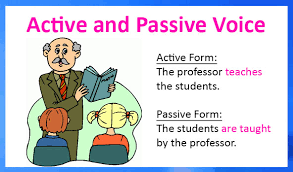The sentence formation of Simple Present Tense follows:
| Active and Passive | Active and Passive | |
| 1st Person | I give = I am given | We give = We are given |
| 2nd Person | You give = You are given | You give = You are given |
| He gives = He is given | ||
| 3rd Person | She gives = She is given | They give = They are given |
| It gives = It is given |
The sentence formation of Simple Past Tense Follows
| Active and Passive | Active and Passive | |
| 1st Person | I gave = I was given | We gave = We were given |
| 2nd Person | You gave = You were given | You gave = You were given |
| He gave = He was given | ||
| 3rd Person | She gave = She was given | They gave = They were given |
| It gave = It was given |
The sentence formation of Simple Future Tense Follows
| Active and Passive | Active and Passive | |
| 1st Person | I shall give = I shall be given | We shall give = We shall be given |
| 2nd Person | You will give = You will be given | You will give = You will be given |
| He will give = He will be given | ||
| 3rd Person | She will give = She will be given | They will give = They will be given |
| It will give = It will be given |
The postman brings letters. (Active Voice)
Letters are brought by the postman. (Passive Voice)
Uses of Passive Voice:
Passive voice is not much used in our native languages, such as Hindi, Gujarati, Punjabi or any other as it looks awkward when it is translated literally. However, it is a usual practice in the English language to use passive voice.
In the IELTS Academic test, passive voice plays an essential role in Task 1 because of its peculiarity in the usage. It is widely used in it because the doer (agent) becomes inconsequential in the sentence construction. In another way, in most sentences in task one and also in our life, we are not inclined to use the doer (agent) over and over again. For example, my car has been moved!
Now, it does not matter who moved it, or I have no idea who did it.
- It is used in colloquial speech. ‘Get’ is sometimes used instead of ‘Be’:
The bottle got (= was) broken.
You will get (= be) demoralized if you keep on watching sad news on TV.
There was a brawl at the party last night, but fortunately, nobody got (= was) hurt.
Some exceptions: get married, get divorced, get dressed, get changed (these expressions are not in the passive voice)
- Some verbs have two objects. For example, give:
Somebody gave her a rottweiler. (Active Voice)
She was given a rottweiler. A rottweiler was given to her. (Passive Voice)
Somebody gave the cops a tip-off about the raid. (Active Voice)
The cops were given a tip-off about the raid. A tip-off about the raid was given to the cops (Passive Voice)
- In some sentences, the doer is unimportant, so it is not necessary to mention them:
The rubbish has not been collected from the last two days.
The streets are washed every night, wasting away precious drinking water.
You will be ten printed when you apply for the US visa.
- In some sentences, the doer is unknown, or you do not know exactly or have forgotten who did this particular action:
The prime minister was assassinated (= by someone, but we have no idea who exactly did this).
The report on my table was taken (= by some team member)
- Sentences using ‘People’ as a doer in active verbs:
She was suspected of having a hand in glove in this corruption case. (People suspected her of…).
The Gandhi family was believed to be a family of saints, but the reports show otherwise. (People believed the Gandhi family…)
- When we use the indefinite pronoun ‘one’ in the active sentence:
One believes (that) this sort of counseling is as unacceptable. (Active Voice)
This sort of counseling is believed as unacceptable. (Passive Voice)
You can see the advert of Coco-Cola everywhere. (Active Voice)
The advert of Coco-Cola is seen everywhere. (Passive Voice)
- In some cases, we tend to be more interested in the action than the person who does it:
The office next door has been bought (by a Mr. Patel).
If we happen to know Mr. Patel, we will use the active form:
Mr. Patel has bought the office next door.
- It is used to avoid an ungrammatical or awkward sentence. We generally do not change the subject:
Before I reached home, my neighbor took Jericho (dog) to a vet.
would be better expressed:
Before I reached home, Jericho was taken to a vet by my neighbor.
- It is used to disclaim responsibility for disagreeable announcements. It is preferred for psychological reasons:
The bonus on top of your remuneration is being cancelled/will have to be cancelled this year as the company did not meet the revenue target.
